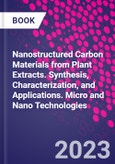Nanostructured Carbon Materials from Plant Extracts: Synthesis, Characterization, and Applications guides the reader through the preparation and utilization of carbon nanomaterials based on various biomass sources, including fruits, vegetables, leaves, pulp and other plant extracts. The book covers the fundamentals of nanostructured carbon materials and synthesis methods from a range of plant sources. Other chapters focus on characterization, analysis, simulation and modeling in order to prepare plant extract based carbon nanomaterials with the required properties. Final sections highlight key application areas, presenting methods and approaches to prepare these materials for specific uses. This book will be of interest to researchers and advanced students across nanomaterials, polymer science, composite science, sustainable materials, chemistry, chemical engineering, and materials science, as well as industrial scientists, engineers, and R&D professionals with an interest in sustainable carbon nanomaterials.
Table of Contents
Part 1: Fundamentals of Nanostructured Carbon Materials from Plant Extracts
1. Introduction to nanostructured carbon materials from plant extracts
2. Bottom-up synthesis method for nanostructured carbon materials
3. Top-down synthesis method for nanostructured carbon materials
4. Synthesis of carbon nanomaterials from fruit extracts
5. Synthesis of carbon nanomaterials from vegetables
6. Synthesis of carbon nanomaterials from leaves and other plant sources
7. Functionalization of carbon nanomaterials from plant extracts
Part 2: Properties and Characterization of Nanostructured Carbon Materials from Plant Extracts
8. X-ray scattering investigation of carbon nanomaterials from plant extracts
9. Neutron scattering investigation of carbon nanomaterials from plant extracts
10. Structural investigation of carbon nanomaterials by FTIR, UV, NMR and Raman spectroscopy
11. Mechanical properties of carbon nanomaterials
12. Crystallization behavior of carbon nanomaterials
13. Thermal characterization of carbon nanomaterials
14. Morphological characterization of carbon nanomaterials
15. Rheological studies of carbon nanomaterials
16. Dielectric and electrical conductivity studies of carbon nanomaterials
17. Simulation and multiscale modeling of carbon nanomaterials
Part 3: Applications of Nanostructured Carbon Materials from Plant Extracts
18. Applications of carbon-based nanomaterials from plant extracts in aeronautics and space
19. Carbon-based nanomaterials from plant extracts in biological and biomedical applications
20. Applications of carbon-based nanomaterials from plant extracts in composite materials
21. Applications of carbon-based nanomaterials in agriculture sector
22. Green synthesized carbon nanomaterials in microelectronics
23. Applications of carbon-based nanomaterials from plant extracts in water desalination by capacitive deionization
24. Carbon based nanomaterials from plant extracts in hydrogen storage applications
25. Energy storage applications of carbon nanomaterials from plant extracts
26. Carbon nanomaterials from plant extracts in environmental remediation applications
27. Applications of carbon-based nanomaterials from plant extracts in water purification
28. Applications of carbon-based nanomaterials from plant extracts in nano fluid
29. Advantages and Disadvantages of Carbon Nanomaterials from Plant Extracts
30. Life cycle analysis of carbon nano structures and decorated carbon nano structures
Authors
Sreeraj Gopi Co-Founder and Director of Molecules Food Solutions Pvt Ltd, Zingon Naturals Pvt Ltd., India.Dr. Sreeraj Gopi is the Co-Founder and Director of Molecules Food solutions Pvt Ltd, Zingon Naturals Pvt Ltd. He was the Chief Scientist at Plant Lipids Pvt Ltd. and Chief Scientific Officer at Aurea Biolabs Pvt Ltd., He has also served as an adjunct professor at universities including Stockholm University, Sweden, Siberian Federal University, Russia, and Mahatma Gandhi University, India. He completed his doctorate in organic chemistry and nanotechnology, and nano drug delivery working in the area of natural products, isolation, and biological activities. He published more than 175 international articles and filed more than 75 patents, in the US and Europe. At Plant Lipids, he developed many innovative products and technologies, and is responsible for driving the research team to excellence, as well as, implementing new projects, presenting scientific seminars to various customers. He was listed world's top 2% scientist list by Standford University.
Aryamol K. S. Project Fellow, School of Energy Materials, Mahatma Gandhi University, India. Aryamol K. S. is a Project Fellow at the School of Energy Materials, Mahatma Gandhi University, India. Her area of specialization is quantum dots from natural resources for different applications, including biomedicine, bioimaging, and drug delivery. Sabu Thomas Professor and Director, International and Interuniversity Centre for Nanoscience and Nanotechnology, Mahatma Gandhi University, India.Prof. Sabu Thomas is a Professor of Polymer Science and Engineering and the Director of the School of Energy Materials at Mahatma Gandhi University, India. Additionally, he is the Chairman of the Trivandrum Engineering Science & Technology Research Park (TrEST Research Park) in Thiruvananthapuram, India. He is the founder director of the International and Inter-university Centre for Nanoscience and Nanotechnology at Mahatma Gandhi University and the former Vice-Chancellor of the same institution.
Prof. Thomas is internationally recognized for his contributions to polymer science and engineering, with his research interests encompassing polymer nanocomposites, elastomers, polymer blends, interpenetrating polymer networks, polymer membranes, green composites, nanocomposites, nanomedicine, and green nanotechnology. His groundbreaking inventions in polymer nanocomposites, polymer blends, green bionanotechnology, and nano-biomedical sciences have significantly advanced the development of new materials for the automotive, space, housing, and biomedical fields. Dr. Thomas has been conferred with Honoris Causa (DSc) by the University of South Brittany, France.
Jozef T. Haponiuk Professor, Head of Department, Department of Polymers Technology, Gdansk University of Technology, Gdansk, Poland. Prof. Jozef T. Haponiuk is Professor and Head of Department, at the Department of Polymer Technology, Gdansk University of Technology, Poland. Prof. Haponiuk is an experienced researcher in the fields of polymer composites, polymer blends, and associated materials. He has received a number of prizes and awards for his work. Hanna J. Maria Senior Researcher, Mahatma Gandhi University, India.Hanna J. Maria is a Senior Researcher at the School of Energy Materials and the International and Inter University Centre for Nanoscience and Nanotechnology, Mahatma Gandhi University, India. Her research focusses on natural rubber composites and their blends, thermoplastic composites, lignin, nanocellulose, bionanocomposites, nanocellulose, rubber-based composites and nanocomposites.








